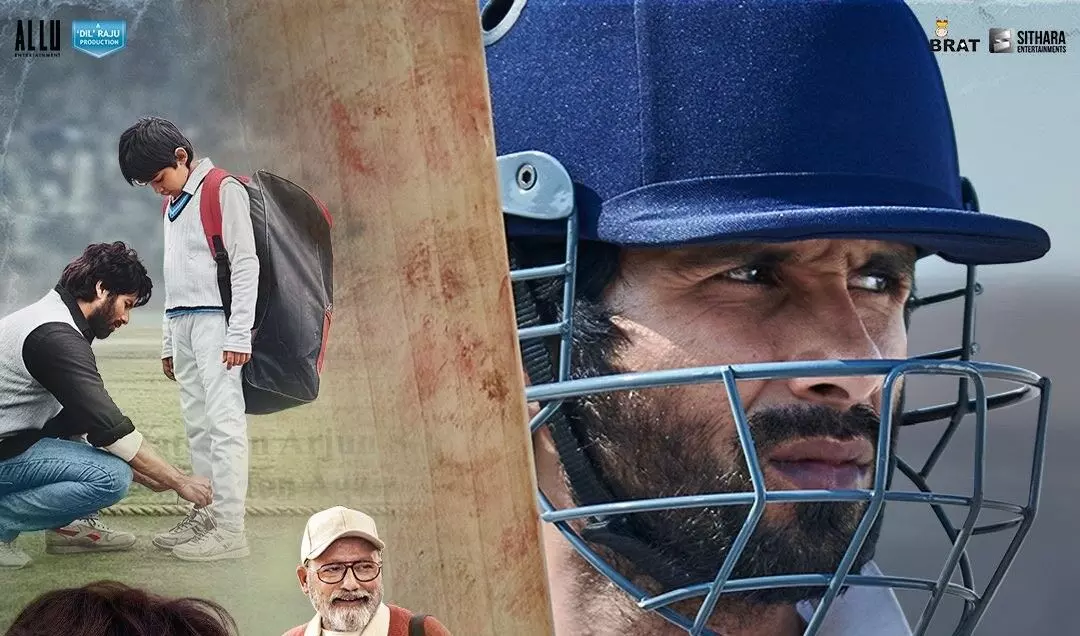JERSEY REVIEW : Shahid Kapoor wins at late 30’s

“Jersey” starring Shahid Kapoor and Mrunal Thakur was released on 22nd April 2022. “Jersey” is the Hindi remake of a Nani starrer Telugu film by the same name that got released in 2019. Gowtam Tinnanuri who directed the original handled the remake too. The sports drama is getting immense responses and positive reviews from the audience, just like the original. Let us look at how the film fares at box office.
Story
Arjun Talwar (Shahid Kapoor), a Ranji cricket player leaves his dream of playing for India due to the struggles and obstacles in his personal life. After many years, Arjun decides to make a comeback into cricket at the age of 36, to prove his worth to his wife Vidhya (Mrunal Thakur) and to be a role model to his son Kittu (Ronit Kamra). How does Arjun chase his dreams at that retirement age is the rest of the story.
Analysis
Director Gowtam Tinnanuri sticks to his original plot and treatment as far as the film goes, the setting and characters are now in North India. Jersey isn’t the stereotypical sports film where you expect cheers and loud applause for every six and a four. It is a serious film and it deals with deeper issues than those that meet the eye. Arjun’s angst, his guilt, his frustration with life and watching it pass him by make him one of the most relatable characters. Shahid goes all out to showcase this pain.
The film is in no rush and most of the characters in the first half take their time to establish their relationship with Arjun. Arjun’s wife Vidya, played beautifully by Mrunal Thakur, is a blow hot blow cold woman who fails to relate to her husbands way of surrendering to his fate. The story oscillates between their flashes of how their love used to be to the desolate state it is now.
The stand-out scene in the film takes place at a train station with Shahid matching the sound of a speeding locomotive with his loud gut-wrenching scream. A tough scene but Kapoor pulls it off with ease. The beauty of the film is the transformation of the characters. Not only the lead character Arjun, but also his wife Vidhya has the equal importance in showing that transformation. Gowtam did a magic in maintaning the character arc for every character in the film.
Performances
Shahid Kapoor delivers an extraordinary performance as a cricketer in the film. His fitness, body language, and game play, everything looks professional as demanded by the character. Shahid is very impressive as a cricketer. But beyond that, he is more impressive in the role of a frustrated and struggling father. Shahid balanced both the shades of being a cricketer and a father so perfectly. Mrunal’s performance as Vidhya is very relatable. All the hope, fear, confusion, and frustration, a newly married young woman has been very clearly portrayed by the actress. She just nailed two shades in the character. One as a loving and supporting girlfriend to Shahid at a young age, and the other as a responsible and opposing wife as the life goes on. She balanced them well.
Pankaj Kapur as an aging assistant coach is a perfect choice for the role. His performance makes the audience believe that as if Pankaj is playing a father to Shahid. Their bonding worked so well. Ronit Kamra as Shahid’s son in the film is as good as he did perform in the original.
Technicalities
Pimarily, the major credit of the entire film goes to the writer and director, Gowtam Tinnanuri. The story itself is the heart and soul of the film. Secondarily, three departments need to be credited equally for the film. Cinematography, background score and production design. All the three departments are exceptional at their work. Cinematographer Anil Mehta captured the cricket shots exceptionally great. Anirudh’s score takes us on an emotional ride. The production design needs a special mention in maintaining the perfect output even though the film shifts to different time periods. Navin Nooli, the national award winning editor for the original repeated his worthy work again.
Positives
Performances
Background score
Cinematography
Story plot
Negatives
Long runtime
© 2024 Hyderabad Media House Limited/The Hans India. All rights reserved. Powered by hocalwire.com




